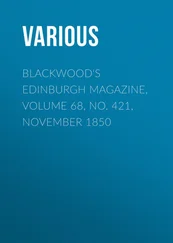Various - Blackwood's Edinburgh Magazine, Vol. 66, No 409, November 1849
Здесь есть возможность читать онлайн «Various - Blackwood's Edinburgh Magazine, Vol. 66, No 409, November 1849» — ознакомительный отрывок электронной книги совершенно бесплатно, а после прочтения отрывка купить полную версию. В некоторых случаях можно слушать аудио, скачать через торрент в формате fb2 и присутствует краткое содержание. Издательство: Иностранный паблик, Жанр: periodic, foreign_edu, Путешествия и география, на английском языке. Описание произведения, (предисловие) а так же отзывы посетителей доступны на портале библиотеки ЛибКат.
- Название:Blackwood's Edinburgh Magazine, Vol. 66, No 409, November 1849
- Автор:
- Издательство:Иностранный паблик
- Жанр:
- Год:неизвестен
- ISBN:нет данных
- Рейтинг книги:3 / 5. Голосов: 1
-
Избранное:Добавить в избранное
- Отзывы:
-
Ваша оценка:
- 60
- 1
- 2
- 3
- 4
- 5
Blackwood's Edinburgh Magazine, Vol. 66, No 409, November 1849: краткое содержание, описание и аннотация
Предлагаем к чтению аннотацию, описание, краткое содержание или предисловие (зависит от того, что написал сам автор книги «Blackwood's Edinburgh Magazine, Vol. 66, No 409, November 1849»). Если вы не нашли необходимую информацию о книге — напишите в комментариях, мы постараемся отыскать её.
Blackwood's Edinburgh Magazine, Vol. 66, No 409, November 1849 — читать онлайн ознакомительный отрывок
Ниже представлен текст книги, разбитый по страницам. Система сохранения места последней прочитанной страницы, позволяет с удобством читать онлайн бесплатно книгу «Blackwood's Edinburgh Magazine, Vol. 66, No 409, November 1849», без необходимости каждый раз заново искать на чём Вы остановились. Поставьте закладку, и сможете в любой момент перейти на страницу, на которой закончили чтение.
Интервал:
Закладка:
8. Resolved. – That, in the opinion of this council, the great extension which has latterly been afforded of moral and religious instruction, the classification which may in future be made in the numerous gaols now in progress of erection, upon the most approved principles of inspection and separation, the most effectual punishment and classification of offenders in ironed gangs, according to their improved system of management – the numerous free emigrants now eligible as the assignees of convicts, and the accumulated experience of half a century – form a combination of circumstances, which renders the colony better adapted at the present, than at any former period, to carry into effect the praiseworthy intentions of the first founders of the system of transportation and assignment, which had no less for its object reformation of character than a just infliction of punishment.
9. Resolved. – That, in the opinion of this council, no system of penal discipline, or secondary punishment, will be found at once so cheap, so effective, and so reformatory, as that of well-regulated assignment – the good conduct of the convict, and his continuance at labour, being so obviously the interest of the assignee; whilst the partial solitude and privations, incidental to a pastoral or agricultural life in the remote districts of the colony, (which may be made the universal employment of convicts,) by effectually breaking a connexion with companions and habits of vice, is better calculated than any other system to produce moral reformation, when accompanied by adequate religious instruction.
10. Resolved. – That, in the opinion of this council, many men who, previously to their conviction, had been brought up in habits of idleness and vice, have acquired, by means of assignment, not only habits of industry and labour, but the knowledge of a remunerative employment, which, on becoming free, forms a strong inducement to continue in an honest course of life.
11. Resolved. – That, in the opinion of this council, the sudden discontinuance of transportation and assignment, by depriving the colonists of convict labour, must necessarily curtail their means of purchasing crown lands, and, consequently, the supply of funds for the purpose of immigration.
12. Resolved. – That, in the opinion of this council, the produce of the labour of convicts, in assignment, is thus one of the principal, though indirect means, of bringing into the colony free persons: it is obvious, therefore, that the continuance of emigration in any extended form, must necessarily depend upon the continuance of the assignment of convicts. 9 9 Colonial Magazine , i. 431, 433.
It is not surprising that they viewed, at this period, the transportation system in this light; for under it they had made advances in population, comfort, and riches, unparalleled in any other age or country of the world.
How, then, has it happened that so great a change has come over the views of the colonists on this subject; and that the system which they formerly regarded, with reason, as the sheet-anchor of their prosperity, is now almost universally looked to with unqualified aversion, as the certain forerunner of their destruction? The answer is easy. It is because transportation, as formerly conducted, was a blessing , and because, as conducted of late years, it has become a curse , that the change of opinion has arisen in regard to it. The feelings of the colonists, in both cases, were founded on experience – both were, in the circumstances in which they arose, equally well founded, and both were therefore equally entitled to respect and attention. We have only to restore the circumstances in which the convicts were a blessing, to revive the times in which their arrival will be regarded as a boon. And to effect this, can easily be shown not only to be attended with no difficulty, but only to require the simultaneous adoption by government of a system of punishment at home, and of voluntary emigration at the public expense abroad, attended with a very trifling expense, and calculated to relieve, beyond any other measure that could by possibility be devised, the existing distress among the labouring classes of Great Britain and Ireland.
To render the introduction of penal labour into a colony an advantage, three things are necessary. 1st, that the convicts sent out should be for the most part instructed in some simple rural art or occupation, of use in the country into which they are to be transplanted. 2d, that they should in general be beginners in crime , and a small number of them only hardened in depravity. 3d, what is most important of all, that they should be preserved in a due proportion , never exceeding a fourth or a fifth to the free and untainted settlers. Under these conditions, their introduction will always prove a blessing, and will be hailed as a boon. If they are neglected, they will prove a curse, and their arrival be regarded as a punishment.
Various circumstances have contributed, of late years, to render the convict system a dreadful evil, instead of, as formerly, a signal benefit to the colonies. But that affords no ground for despair; on the contrary, it furnishes the most well-grounded reason for hope. We are suffering under the effects of an erroneous regimen, not any inherent malady in the patient. Change this treatment, and his health will soon return.
It is well known that the greatest pains have of late years been taken, in this country, to instruct prisoners in jail in some useful handicraft; and that, so far has this been carried, that our best-regulated jails are more in fact great houses of industry. The general penitentiary at Pentonville, in particular, where the convicts sentenced to transportation are trained, previous to their removal to the penal settlements, is a perfect model of arrangement and attention in this important respect. But it is equally well known that it is only of late years that this signal reform has come into operation; and we have the satisfaction of knowing that already its salutary effects have been evinced, in the most signal manner, with the convicts sent abroad. Previous to the year 1840, scarcely anything was done on any considerable scale, either to teach ordinary prisoners trades in jail, to separate them from each other, or to prepare them, in the public penitentiaries, for the duties in which they were to be engaged, when they arrived at their distant destination. The county jails, now resounding with the clang of ceaseless occupation, pursued by prisoners in their separate cells, then only re-echoed the din of riot and revelling in the day-rooms where the idle prisoners were huddled together, and beguiled the weary hours of their captivity by stories of perpetrated crime, or plans for its renewal the moment they got out of confinement. But the ideas of men are all formed on the experience of facts, or the thoughts driven into them, for a considerable time back. The present universal horror at transportation is founded on the experience of the prisoners with which, for a quarter of a century, New South Wales had been flooded, from the idle day-rooms or profligate hulks of Great Britain. Some years must elapse before the effects of the improved discipline received, and laborious habits acquired, in the jails and penitentiaries of the mother country, produces any general effect on public opinion in its distant colonies.
The relaxation of the severity of our penal code at home, during the last thirty years, however loudly called for by considerations of justice and humanity, has undoubtedly had a most pernicious influence on the class of convicts who have, during that period, been sent to the colonies. In so far as that change of system has diminished the frequency of the infliction of the punishment of death, and limited, practically speaking, that dreadful penalty to cases of wilful and inexcusable murder, it must command the assent of every benevolent and well-regulated mind. But, unfortunately, the change has not stopped there. It has descended through every department of our criminal jurisprudence, and come in that way to alter much for the worse the class of criminals who of late years have been sent to the penal colonies. The men who were formerly hanged are now for the most part transported; those formerly transported are now imprisoned; and those sent abroad have almost all, on repeated occasions, been previously confined, generally for a very long period. As imprisonment scarcely ever works any reformation on the moral character or habits of a prisoner, whatever improved skill in handicraft it may put into his fingers, this change has been attended with most serious and pernicious effect on the character of the convicts sent to the colonies, and gone far to produce the aversion with which they are now everywhere regarded.
Читать дальшеИнтервал:
Закладка:
Похожие книги на «Blackwood's Edinburgh Magazine, Vol. 66, No 409, November 1849»
Представляем Вашему вниманию похожие книги на «Blackwood's Edinburgh Magazine, Vol. 66, No 409, November 1849» списком для выбора. Мы отобрали схожую по названию и смыслу литературу в надежде предоставить читателям больше вариантов отыскать новые, интересные, ещё непрочитанные произведения.
Обсуждение, отзывы о книге «Blackwood's Edinburgh Magazine, Vol. 66, No 409, November 1849» и просто собственные мнения читателей. Оставьте ваши комментарии, напишите, что Вы думаете о произведении, его смысле или главных героях. Укажите что конкретно понравилось, а что нет, и почему Вы так считаете.












